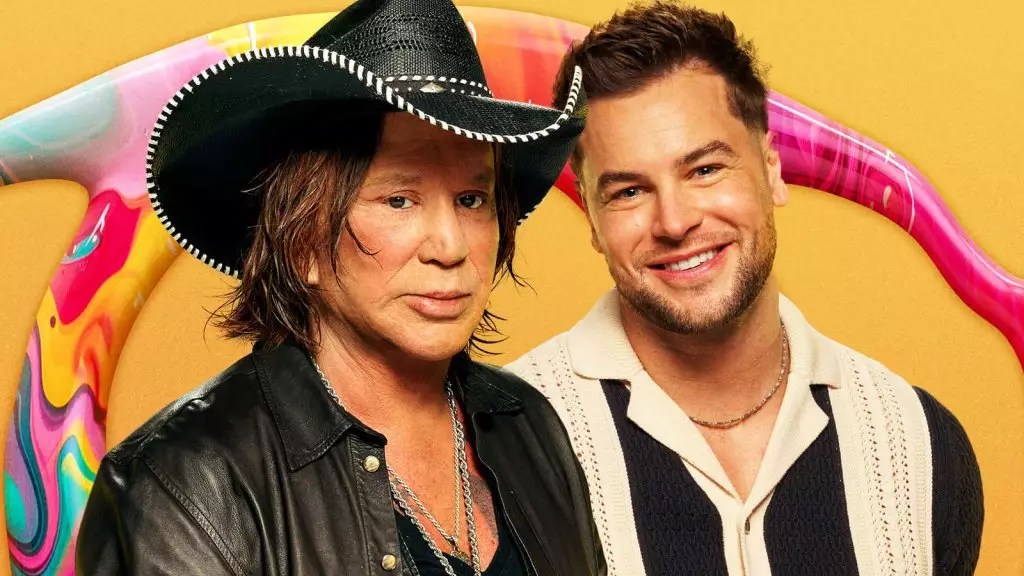Mickey Rourke, a figure renowned for both his tumultuous film career and unpredictable behavior, has once again made headlines, this time igniting a firestorm on the reality television show Celebrity Big Brother UK. The latest episode promises to serve as a gripping drama, showcasing the volatile interactions among contestants that often define the reality TV genre. However, Rourke’s recent dismissal due to inappropriate conduct sends a powerful message not just about individual behavior, but also about the limits of celebrity antics in modern entertainment.
This incident unfolded during a pirate-themed group task where contestants were expected to collaborate—a scenario designed to foster camaraderie, or so it was believed. Rourke’s altercation with fellow contestant Chris Hughes escalated quickly, revealing a side of Rourke that many fans have come to associate with his checkered past. The moment was rife with hostility, as Mickey confronted Chris with phrases like, “Don’t eyeball me,” a stark indication of his short temper and inability to diffuse conflicts amicably.
A Study in Poor Choices
While Rourke’s outbursts are hardly shocking given his background, they raise questions about personal accountability, especially in a public setting. His dialogue with Chris deteriorated into a barrage of insults, including the explicit phrase, “You c***.” In such moments of confrontation, reality television can reveal the raw and often problematic facets of human interactions. Big Brother’s immediate intervention highlights the show’s increasing intolerance for aggressive behavior, sure to usher in discussions about representing mental health and boundaries on such platforms.
After being called to the Diary Room for a serious conversation about his aggressive behavior, Rourke expressed remorse, stating, “I stepped over the line.” This confession, however, could be viewed as a hollow attempt to portray himself as a victim of his own emotions rather than taking full ownership of his actions. The nuances of Rourke’s apology underscore a familiar narrative in celebrity culture: where missteps often turn into media spectacles rather than genuine reflections on personal growth.
The Cycle of Disregard
Rourke’s departure from the house was inevitable, a culmination of his previous indiscretions, including a recent incident involving a homophobic slur aimed at fellow contestant JoJo Siwa. His rationale—that he was merely “talking smack”—reveals a startling lack of awareness regarding the implications of his words. His attempts to mitigate his behavior by insisting he didn’t “mean it” as a serious offense only serve to highlight a troubling aspect of public personas: the tendency to sidestep accountability while masquerading as misunderstood artists.
Moreover, Siwa’s nomination of Rourke not only adds another layer of complexity to the dynamics of the house but also illustrates the power struggles inherent in such reality competitions. The interplay of friendships and rivalries often leads to surprising eliminations, and Rourke’s presence had become a focal point of controversy, attracting criticism from both fellow contestants and the audience.
Shadows from the Past
As if his on-screen behavior wasn’t enough, Rourke’s history looms like a specter, raising eyebrows toward his conduct in the past. Allegations of misconduct during the shoot of the film Girl, as highlighted by former co-star Bella Thorne, paint a troubling picture of a man who has long dealt with the consequences of his aggressive tendencies. Whether these allegations have any weight in the public eye or not, they contribute to the narrative of a flawed artist struggling to navigate the demanding landscape of fame and personal accountability.
This recent episode of Celebrity Big Brother UK challenges viewers to reassess their appetite for controversial figures in entertainment. Is there a limit to how much we should tolerate under the guise of authenticity? Rourke’s journey within the show serves as a powerful reminder that the boundaries of acceptable behavior can and should be scrutinized, both by the show’s producers and the viewing audience.
The Broader Implications of Celebrity Culture
In a world increasingly scrutinized for its treatment of mental well-being, Rourke’s latest misadventures invite discussions on broader societal themes: the normalization of aggression, the exploitation of celebrity breakdowns, and the importance of responsible platforming in the media. Fans may be drawn to the chaos that Rourke represents, but it raises uncomfortable questions about our complicity in enabling such behavior.
Ultimately, while audiences are captivated by the drama of reality TV, Mickey Rourke’s latest outburst underscores a need for reflection—both on the part of the contestant and the viewers. In an era when celebrity behaviors are constantly broadcasted, the question remains: as a society, what will we choose to accept—and what consequences should accompany those choices?
